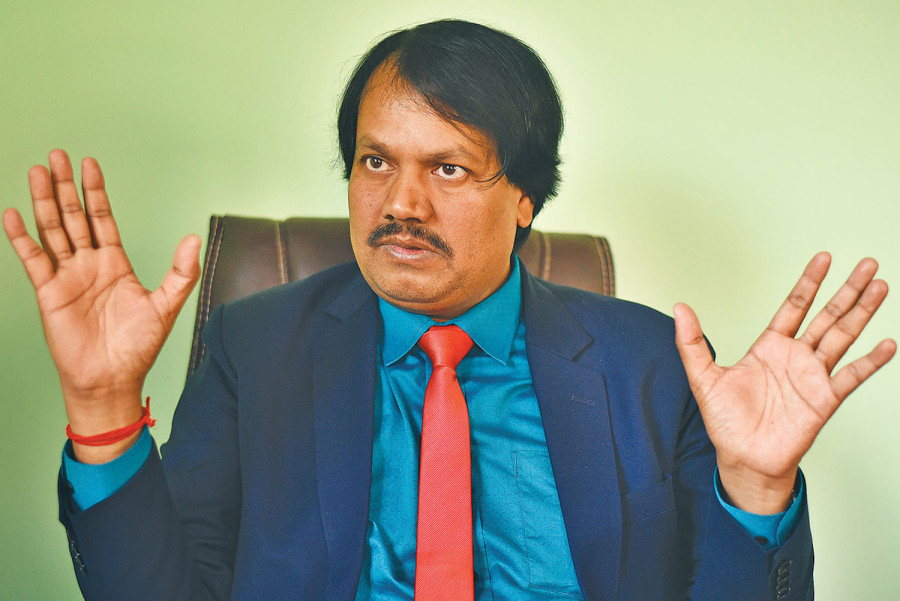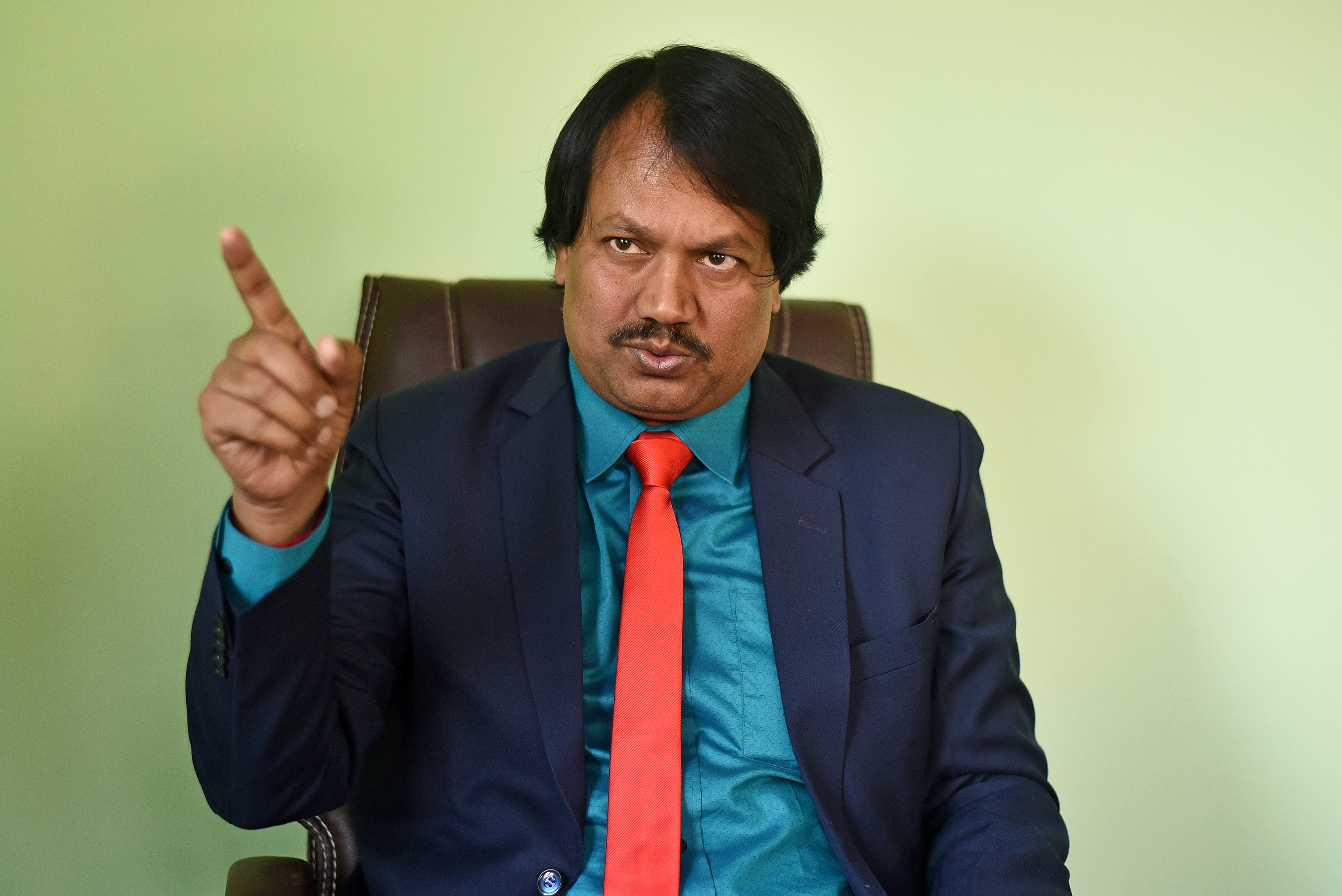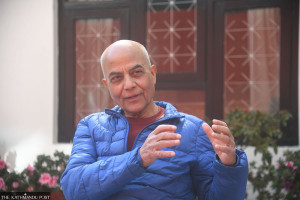Interviews
Federal coalitions have weakened provinces
International forces have more influence than what we generally assume. They micromanage events here.
Thira Lal Bhusal
CK Raut has drawn national attention ever since he entered Nepali politics a decade ago. Abandoning his secessionist agenda he established the Janamat Party, which participated in its first general elections last year and succeeded in becoming a national party. Thira Lal Bhusal of the Post talked to the party chief Raut about his experience in the federal Parliament as well as the provincial governments.
It’s been over a year since your party had a decent outing in general elections and later joined the federal and provincial governments. Do you think you succeeded in meeting public expectations?
We had assumed government agencies would address issues when elected representatives raised them in Parliament and other platforms. But we didn’t see that. We were ignored even as we repeatedly raised issues of public concern in the House. That made us question Parliament’s relevance for the general public. At times, we questioned ourselves: Are we speaking in House meetings just for public consumption? As parties issue whips to their lawmakers, they aren’t free to speak their mind and act on their own conscience. So small parties don’t get the support of lawmakers from other parties even if you float a good idea. Likewise, the Parliament’s functioning is more procedural, not result-oriented. The months-long last session passed only one law. There are no transparent discussions even on vital bills. A handful of leaders from big parties hold discussions in syndicated and non-transparent fashion.
Are you saying your faith in Parliament has been dented in just a year of entering it?
Yes, the trust has diminished. We had thought we could bring about some positive changes from there. We had expected to introduce good laws. Our voices weren’t heard. So, our assumption that our presence in the House would be meaningful was proven wrong.
Just like leaders of older parties, you too spent months bargaining for a ministerial portfolio. So what is the difference between you and traditional parties?
If Janamat was like other parties, its chair would have become a minister. In our party, the chairman didn’t join the government. He recommended other leaders. Leaders from other parties would lobby to get a ministry with a big budget and influence. If they didn’t get the lucrative portfolio, they would join the Cabinet with whatever ministry they got. But we asked for the ministry of industry, which has a budget of less than Rs10 billion. We chose it as our party envisions massive job-creation. Our second choice was the agriculture ministry as we led a movement for peasants.
We had said that we would stay in government only if we can deliver. When we weren’t allowed to work as per our plans in the Ministry of Water Supply, we quit. We were different. We rejoined the government in August at the head of the Ministry of Federal Affairs and General Administration. The latest report card prepared by the Council of Ministers shows that our minister has done a great job.
You claim to be different but you couldn’t stay outside the government. After insisting on the ministries of your choice, you eventually joined the government leading the ministry that wasn’t your choice. You made a compromise, didn’t you?
We were a coalition partner but they treated us as an opposition party. We were discriminated against while allocating budget as we weren’t in the Cabinet. When you aren’t leading a ministry, those in other ministries don’t listen to you. We realised the importance of this over time. Only then did we join the Cabinet.

What was your party’s experience of leading a ministry?
We found it very different from our expectations. We had thought that a minister commands the ministry with full authority. But the laws don’t give power to the minister who can’t even appoint secretaries or joint secretaries. They are rather deputed by the Council of Ministers. Other staff are selected by the secretary and joint secretaries. Top bureaucrats are the ones who evaluate employees’ performances and transfer them. Then why would they be loyal to the minister? We thus have a bureaucracy-dominant system which is difficult to change.
Do you think there should be a change in this arrangement?
Yes. The civil servants don’t obey ministers’ instructions. They say, “The ministers come and go, we are the permanent government.” Therefore, I have repeatedly raised this issue with the prime minister and in the coalition meetings as well. When the civil service bill was forwarded to our ministry, we immediately told the prime minister that we need to make changes in it. The secretaries have drafted the bill, making themselves more powerful. But the prime minister didn’t heed our concern.
What changes have you been able to effect from within the government?
We tried to cut the red tape in the ministry we are leading. It is difficult. We had confrontations with secretaries. We have strictly prohibited any bribery for the transfer of civil servants. Mayors, even from other parties, have appreciated us for easing the process and for deputing employees based on merit.
Now let us come to the federal system. Why do you think the provinces are becoming unpopular?
Provinces are deliberately portrayed as unpopular. Federalism is an excellent system. It is the right fit for Nepal’s socio-cultural, linguistic, geographic diversities. The section of society that has been enjoying centralised power for over 200 years doesn’t want to give up the power. In the past, people from remote villages of Karnali or Madhes had to frequent Kathmandu to build even a small bridge or canal in their village. Now the villagers can get such work done from their own municipality. Kathmandu-centric people now feel bypassed and they are trying to make provinces unpopular.
As you said, the provinces and local governments now have the authority to undertake development work. But are they doing it?
In the past, one class ruled the country for over 100 years. One king or the other ruled for decades with absolute power. Let’s compare development activities done during their rule and the works done in the past five-six years under the federal system. Of late, you can find quality roads even in far-flung villages. In the past, a Dalit wouldn’t be able to walk in public with their head held high. Now each ward of each local unit has a Dalit representative. They have their say in decision making of the local government. The progress is incomparable.
What are the areas the provinces can improve on?
First, the centre should change its attitude towards the provinces. Initially, they designed the provinces wrong. They gave more power to centre and local levels while giving little to the provinces. It’s been eight years since the promulgation of the constitution, but they are yet to formulate a number of laws as per the statute. Even the bills passed by the Parliament haven’t been implemented. The provinces don’t have their own police and civil servants. The provinces can’t work independently as the list of powers given to them are mostly under concurrent lists, to be shared either with the centre or local levels.
Don’t you think the provinces became unpopular as they were seen to be promoting corruption and embracing some of the same flawed practices that made politicians at the federal level unpopular?
This is happening as leaders in provinces can’t work independently. The federal coalition rules in provinces as well. Even a provincial minister is picked from Kathmandu. The provinces are weakened by national coalitions and centralised politics.
Who do you feel more comfortable working with, regional forces or big parties?
The regional parties have adopted a policy of negation with us. The chief minister in Madhesh Province gave our minister no portfolio for some time. Later, our minister got the agriculture ministry and did rather well. Then they swiftly removed him from the ministry. After that we got the education ministry. We were doing well there as well. Again they split the ministry. They resorted to such tactics out of a sense of rivalry. We had expected a better environment at the centre. But we are not involved in the key decision making process in Kathmandu as well. Two or three leaders hold talks and take most decisions. The same are made public as the decisions of the ruling coalition. We small parties are compelled to accept them. We don’t have an option as the coalition can run even without us.
Why do you then stick to the coalition?
As we are connected to the communities, people contact us when they have any difficulty getting their work done. They call us not only for a road or bridge but also when an official doesn’t register their case. We can’t tell them it’s not our duty. We are lawmakers but social and development activities are as important for us as we want to do something for the people. When we are in government, bureaucrats listen to us. Otherwise, they don’t. Therefore, we are compelled to be a part of the government.
Madhesi parties and leaders are often accused of seeking more powers from Kathmandu but not doing enough to end discriminatory practices and social anomalies in their constituencies.
We raise this issue as a major agenda. There is a huge population of Dalits in Madhesh. But they aren’t represented in the provincial Cabinet. Even women and those from Tharu and Khas-Arya communities aren’t accommodated. Our party has recommended a Dalit woman as a minister of state but they are yet to administer her oath of office. Such is also the case with other appointments. Social injustice and corruption are rampant. As the minister from our party in Madhesh opposes wrongdoing, the finance minister there doesn’t cooperate with him. These anomalies frustrate the people.
Involvement of international forces including the two big neighbours is said to be increasing in Nepal. Is that also your view?
International forces have more influence here than what we generally assume. They want to influence even the decisions to transfer secretaries and joint secretaries. They micromanage to that extent. Leaders from major parties feel insecure without their backing. People should choose efficient leaders with integrity to reduce external influence. We should not accept interference just because we need outside support in development activities.




 10.12°C Kathmandu
10.12°C Kathmandu



.jpg&w=200&height=120)








